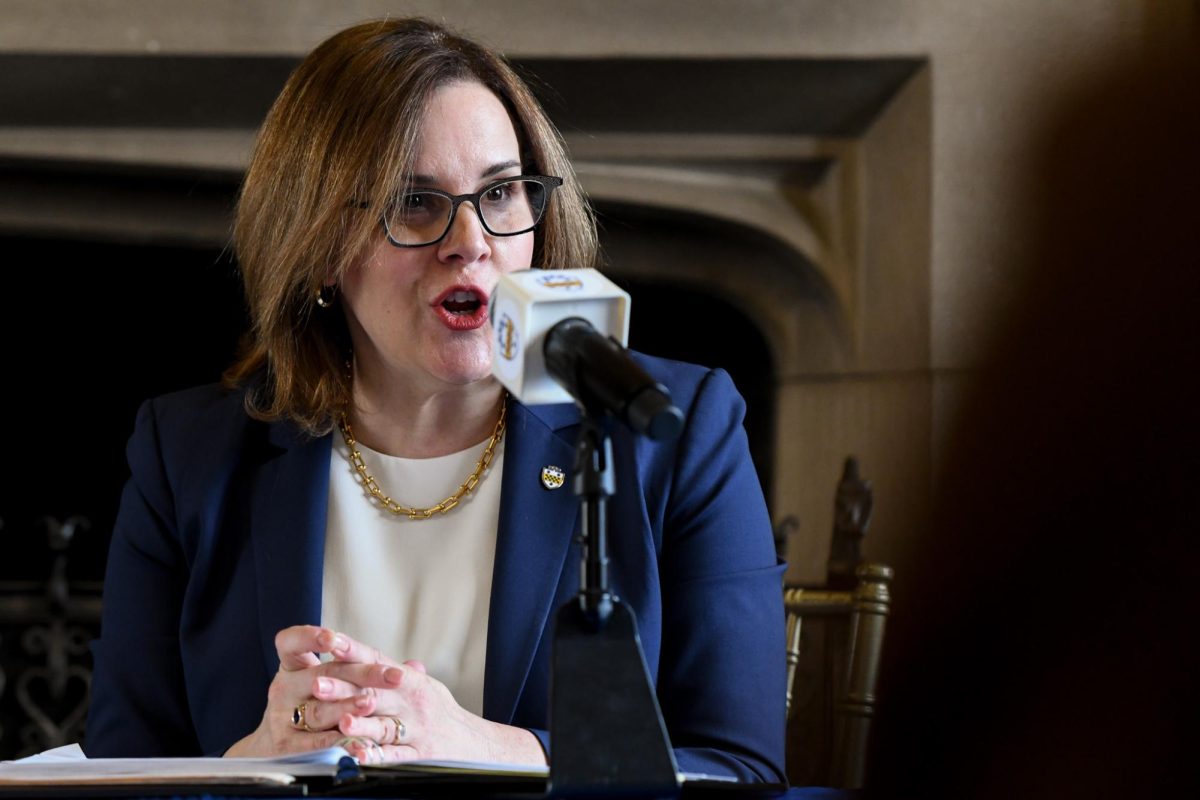Joan Gabel, Pitt’s newest chancellor, described Pitt as a newly awakened “sleeping giant” in terms of opportunity and potential — a metaphor used by former chancellor Patrick Gallagher as well.
“There’s an incredible momentum here, that the vast majority of it is positive so that we can face the things that are more challenging,” Gabel said. “We have what we need to do that, and that we look at ourselves in the future and think that we’re serving students, that our faculty and staff are able to explore their professional and creative interests in a supported, fair and dignified way, and that we’re serving our community.”
Gabel started her term as Pitt’s 19th chancellor on Monday, replacing Patrick Gallagher, who held the position since 2014. The Board of Trustees announced Gabel as the University’s chancellor-elect following a vote on April 3, which was preceded by a lengthy and quiet search process by the Board’s search committee. She is the first woman to hold the chancellor position at Pitt.
Prior to her arrival at Pitt, Gabel served as the president and chief executive of the University of Minnesota Twin Cities campus and university system since 2019. While at Minnesota, Gabel oversaw NXT GEN MED, a health sciences program between the university, Google and Mayo Clinic, as well as the conclusion of a 10-year, $4 billion capital campaign ahead of schedule.
Gabel received pushback following a controversial decision to take a paid corporate board seat at Securian Financial, which has more than $1 billion worth of business with UMN. She left Securian Financial in January. The decision led the university to review its conflict policies, following criticism from the governor and state attorney general.
Gabel publicly announced her new position as Pitt’s next chancellor in April.
In the interview, Gabel acknowledged that high university costs are likely the “top of every students’ concern list,” at Pitt and elsewhere. She said costs often increase as a result of inflation in order to ensure “quality for the student experience,” but believes that the University should spend strategically to offset costs placed on students.
“You make sure as a community, as a team, that the investment that every student is making, even if they’re on a completely free ride, with their time…that it’s an investment that returns, that the education that you get here, the experience that you have here, the network you build here, will serve you,” Gabel said. “Are we doing everything that we can other than raising tuition? Is raising tuition the last mile? Are we paying very close attention to student need? And are we ensuring quality?”
As the cost of tuition and fees continues to increase, some students continue to criticize the University’s affordability and financial decisions. Some students have even raised questions over the new chancellor’s salary. Gabel will receive a $950,000 base salary, a 36% increase from Gallagher’s, which he said is the median for AAU universities.
Gabel takes on the role of chancellor in the wake of several controversial campus events and subsequent protests in the last academic year, as well as student concerns over the University’s safety. She said as someone “between conflicting viewpoints” herself, she believes exposure to “points and counterpoints” is part of an educational environment. But she also believes it is important to recognize some of these points may cause distress.
“But that does not mean that there aren’t points expressed that don’t cause real and legitimate pain in different ways,” Gabel said. “And in some ways, it would be very nice if we could just say anything that’s painful, we won’t do, but in addition to that being illegal and unconstitutional, it is a lost opportunity to fully understand the spectrum of thought, even if the outcome of that understanding is to fundamentally reject it.”
In response to her thoughts on faculty union bargaining and staff unionization efforts that continue to persist across the University, Gabel said she is a believer in shared governance, and embracing the “agency that different stakeholders have” in expressing and advocating for their needs.
“That doesn’t mean that I diminish or don’t see that we come to this point with some challenges,” Gabel said. “I’m not [unaware] of the challenges that we’re facing. But I think that the questions being called are the right questions and I want to work together to try and find answers.”
Gabel looks forward to her new start at Pitt, describing how the University’s reputation in academia and research drew her to apply for the position. She also shared that she notices the “heart” of the community as a Pitt parent.
Gabel said she looks forward to the challenges of leading the University, saying it will be “hard and interesting and fulfilling” all at once, and that there’s no “moment where a university is ‘done’” improving.
“There are great opportunities, obvious opportunities and academic strength in student programs,” Gabel said. “And those very same things are where some of the pivot points and forks in the road are in higher education. I don’t mean to minimize the work that we need to do, but I think we have what we need in terms of commitment and people and advocacy to get those things right, and to continuously get better, so that our students’ investment is meaningful.”
This article was updated to correct the timeline of Gabel’s association with Securian Financial. The Pitt News regrets this error.



